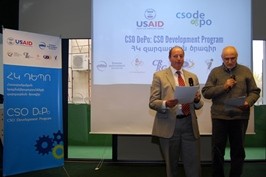
For Immediate Release
Yerevan, Armenia – The Eurasia Partnership Foundation, together with the Caucasus Research Resource Centers-Armenia, Media Initiatives Center, Goris Press Club, Support for Noyemberyan NGO, and Martuni Women Community Council, held the public launch of the “CSO DePo: Civil Society Organizations Development Program on November 4, 2014. The five-year initiative, funded by the U.S. Agency for International Development, will foster sustainable development of the civil society by strengthening the capacity of CSOs as critical actors to advance and oversee reform, improve services and contribute to the development of more effective governance in the economic, democratic, health and social spheres.
In his welcome remarks, US Ambassador to Armenia John Heffern stated that “there is nothing more important in a country like Armenia, where the political and economic power is so centralized, than to find and help build the capacity of other organizations to begin disperse that power in a helpful way. Civil society is critical in this effort and people from regions are also a critical part of this puzzle.”
The head of the USAID/Armenia Program Office Mervyn Ellis noted that CSOs could be a source of innovation and social cohesion, promoting participatory and inclusive governance. “Increasingly, we share the belief that local institutions, including rural ones, private sector partners, and civil society organizations, serve as the engines of growth, inclusivity, and opportunity. That’s why USAID/Armenia has made a significant shift in the way we do business by deliberately refocusing our funding towards local initiatives and by partnering directly with rural and urban NGOs and businesses, and the Government of Armenia. This approach has underscored USAID’s renewed focus on working hand-in-hand with the very men and women that we aim to assist, by encouraging their leadership and tapping into their expertise and unique capabilities,” said Ellis.
The Executive Director of Eurasia Partnership Foundation (EPF) Gevorg Ter-Gabrielyan and Program Manager Gayane Mkrtchyan presented different aspects and plans of the program, its methodology, components and tools.
Ter-Gabrielyan emphasized the important role of the civil society in advancing the reform process and increasing public awareness and participation in the implementation of reforms. “CSOs are the quintessential institutional agents of change. CSOs are visionary, non-partisan, and freedom-oriented. They promote volunteerism, they are flexible, active, committed and innovative. They are one of the main foci of freedoms and committed service provision. They cooperate with state structures, but they also embody freedom and express criticism and this is exactly the vision of the CSO DePo program,” he said.
Mkrtchyan shared that the program would develop a special Armenia-tailored CSO Capacity Measurement Tool, conduct a CSO comprehensive market assessment, and elaborate several CSO sustainability models for beneficiary CSOs. She noted that the program would later establish a CSO Management School that would become a support hub for the civil society. “The School will offer trainings on project management, organizational development, business planning, advocacy, gender mainstreaming, service provision, and other needed skills, coupled with the creation of a Civil Society Portal (CSO Portal) that will offer up-to-date tools and information on CSO development and funding opportunities,” she said. Program implementers expect that over the five years, up to 160 CSOs will undergo training, either in-person or on-line. The most advanced CSOs will be invited to bid for accompanied grants to support their capacity development.







Comment
Make a general inquiry or suggest an improvement.